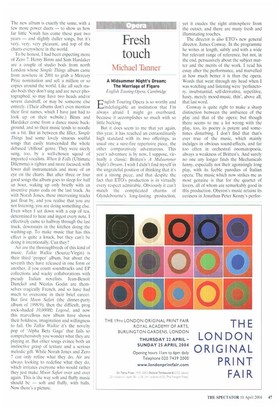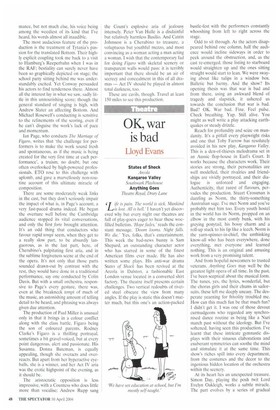Fresh touch
Michael Tanner
A Midsummer Night's Dream; The Marriage of Figaro English Touring Opera. Cambridge
nglish Touring Opera is so worthy and _L/indefatigable an institution that I'm always afraid I might go overboard, because it accomplishes so much with so little backing.
But it does seem to me that yet again, this year, it has reached an extraordinarily high standard with its two offerings, as usual one a sure-fire repertoire piece, the other comparatively adventurous. This year's adventure is by now, I suppose, virtually a classic: Britten's A Midsummer Night's Dream. I wish I didn't find myself in the ungrateful position of thinking that it's not a strong piece, and that despite the fact that ETO's production is in virtually every respect admirable. Obviously it can't match the complicated charms of Glyndebourne's long-lasting production,
yet it exudes the right atmosphere from the outset, and there are many fresh and illuminating touches.
The director is also ETO's new general director, James Conway. In the programme he writes at length, subtly and with a wide but relevant range of reference, but not, in the end, persuasively about the subject matter and the merits of the work. I read his essay after the performance, and marvelled at how much better it is than the opera. Words that went through my head when I was watching and listening were 'perfunctory, insubstantial, self-derivative, repetitive, hasty, merely mood-music, thin', above all, that last word.
Conway is quite right to make a sharp distinction between the ambience of the play and that of the opera: but though there seems to me a lot wrong with the play, too, its poetry is potent and sometimes disturbing. I don't find that that's ever true of the music, which mainly indulges in obvious sound-effects, and far too often in orchestral onomatopoeia, always a weakness of Britten's. And surely no one any longer finds the Mechanicals funny, especially not their agonisingly long play, with its feeble parodies of Italian opera. The music which now strikes me as most genuine is that for the quartet of lovers, all of whom are remarkably good in this production. Oberon's music retains its eeriness in Jonathan Peter Kenny's perfor
mance, but not much else, his voice being among the weediest of its kind that I've heard, his words almost all inaudible.
The most audacious feature of the production is the treatment of Tytania's passion for the translated Bottom. Their highly explicit coupling took me back to a visit to Hamburg's Reeperbahn when I was in the RAF; bestiality can surely never have been so graphically depicted on stage; the school party sitting behind me was understandably excited. Yet Conway persuaded his actors to find tenderness there. Almost all the interest lay in what we saw, sadly little in this unnourisbing score; though the general standard of singing is high, with Andrew Slater an affecting Bottom. And Michael Rosewell's conducting is sensitive to the refinements of the scoring, even if he can't disguise the work's lack of pace and momentum.
Ian Page, who conducts The Marriage of Figaro, writes that the challenge for performers is to make the work sound fresh and spontaneous, as if the music is being created for the very first time at each performance', a truism, no doubt, but one often overlooked by high-powered professionals. ETO rose to this challenge with aplomb, and gave a marvellously non-routine account of this ultimate miracle of composition.
There are some moderately weak links in the cast, but they don't seriously impair the impact of what is, in Page's account, a very fast-paced drama indeed. He began the overture well before the Cambridge audience stopped its vital conversations, and only the first forte brought attention. It's an odd thing that conductors who favour rapid tempi seem, when they get to a really slow part, to be absurdly languorous, as in the last part, here, of Cherubino's palpitating first aria, and in the sublime forgiveness scene at the end of the opera. It's not only that those parts sounded drawn-out by contrast with the rest, they would have done in a traditional performance, say one conducted by Cohn Davis. But with a small orchestra, responsive to Page's every gesture, there was, even at the breakneck tempi of much of the music, an astonishing amount of telling detail to be heard, and phrasing was always given due attention.
The production of Paul Miller is unusual only in that it brings in a colour conflict along with the class battle, Figaro being the son of coloured parents. Rodney Clarke's Figaro is a thrilling portrayal, sometimes a bit gravel-voiced, but at every point dangerous, alert and passionate. His Susanna, Donna Bateman, is equally appealing, though she overacts and overreacts. But apart from her hyperactive eyeballs, she is a winner, and her Act IV aria was the erotic highpoint of the evening, as it should be.
The aristocratic opposition is less impressive, with a Countess who does little more than vocalise; Andrew Rupp sang the Count's explosive aria of jealousy intensely. Peter Van Hulie is a disdainful but relatively harmless Basilio. And Catrin Johnsson is a Cherubino to treasure, a voluptuous but youthful mezzo, and most convincing as a woman acting a man acting a woman. I wish that the contemporary fad for doing Figaro with skeletal scenery or transparent walls would pass: it is terribly important that there should be an air of secrecy and concealment in this of all dramas — Act IV should be played in almost total darkness, too.
These are cavils, though. Travel at least 150 miles to see this production.



































































 Previous page
Previous page